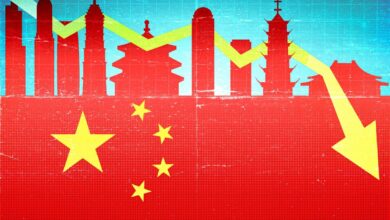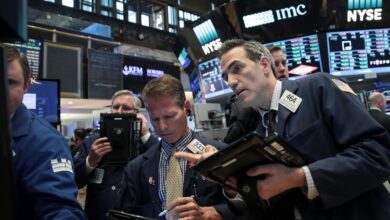Europeans Face Trump Deer in Headlights
Europeans are facing the prospect of Trump like a deer caught in headlights. The image is stark, isn’t it? Frozen, vulnerable, unsure of how to react. This isn’t just a dramatic metaphor; it speaks to a very real anxiety rippling across the continent. The potential return of Trump-style politics throws European stability into question, raising concerns about trade wars, fractured alliances, and a general sense of uncertainty about the future.
This post dives into the potential economic, political, and social impacts of such a scenario, exploring how Europe might navigate this potentially turbulent period.
From the potential for renewed trade tariffs crippling key European industries to the unpredictable shifts in geopolitical alliances, the implications are far-reaching and deeply concerning for many. We’ll examine how different European nations might respond, the strengths and weaknesses of their current strategies, and what steps they might take to protect their interests in a world where predictability seems to be a thing of the past.
The Metaphor’s Meaning: Europeans Are Facing The Prospect Of Trump Like A Deer Caught In Headlights
The phrase “deer caught in headlights” perfectly encapsulates the perceived state of Europe in the face of potential future events stemming from the actions and influence of Donald Trump. It speaks to a feeling of paralysis, of being overwhelmed by an unexpected and potentially dangerous situation, leaving many feeling unable to react effectively. This isn’t simply about political disagreement; it’s about a deeper sense of vulnerability and uncertainty about the future of international relations.The metaphor’s power lies in its visceral imagery.
A deer frozen in the glare of headlights represents a creature stripped of agency, unable to escape a looming threat. This helplessness resonates deeply with Europeans who, accustomed to a certain level of stability and predictability in global affairs, now face a potential shift in the established order, one they feel ill-equipped to navigate. The feeling isn’t necessarily one of outright fear, but rather a disconcerting blend of apprehension, uncertainty, and a sense of being caught off guard.
Historical Parallels to European Helplessness
Several historical events offer parallels to the current situation. The 1930s, leading up to World War II, saw many European nations initially failing to adequately respond to the growing threat of Nazi Germany. A similar sense of unpreparedness and a failure to effectively coordinate responses characterized the early stages of the Cold War, leaving many European countries caught between the superpowers.
These examples highlight the potential consequences of inaction and the importance of proactive diplomacy and strategic planning in the face of significant geopolitical shifts. The inability to predict or prevent major crises can leave nations feeling vulnerable and reactive rather than proactive.
Emotional and Psychological Impact on European Populations
The “deer in headlights” metaphor suggests a range of emotional and psychological responses within European populations. Anxiety and uncertainty are prominent, fueled by the unpredictable nature of Trump’s actions and pronouncements. This uncertainty extends to various aspects of life, from economic stability to national security. Furthermore, a sense of disillusionment with established political structures and international institutions may arise if these structures are perceived as failing to adequately protect European interests or provide clear guidance during times of uncertainty.
This can lead to political polarization and social unrest, as people grapple with feelings of powerlessness and a loss of control over their own destinies. The sense of vulnerability is palpable, leading to increased stress and a feeling of being at the mercy of external forces beyond their immediate control.
Strategic Responses
Europe finds itself navigating increasingly unpredictable geopolitical waters, facing the potential for a resurgence of populist, nationalist, and protectionist policies globally. While a direct comparison to a specific individual is inherently limiting, the potential for disruptions to established international norms and cooperation warrants a proactive and multifaceted strategic response. Europe’s existing mechanisms, while robust in some areas, require strengthening and adaptation to mitigate the potential negative impacts of such an environment.Existing mechanisms and strategies already in place to mitigate potential negative impacts include strengthened internal cooperation within the European Union.
This involves enhancing the EU’s own regulatory power to counter external pressures and protect its internal market. The EU’s common foreign and security policy, though often criticized for its slow pace, provides a framework for coordinated action on issues ranging from trade to sanctions. Furthermore, bilateral agreements with key global partners remain crucial in maintaining economic and political stability.
However, these existing strategies need bolstering to meet the challenges of a more fragmented and unpredictable global order.
Strengthening Internal Cohesion, Europeans are facing the prospect of trump like a deer caught in headlights
The EU’s resilience hinges on its internal cohesion. This requires addressing existing economic disparities between member states and promoting a stronger sense of shared identity and purpose. A more robust social safety net across the EU could help mitigate the impact of economic shocks and prevent the rise of populist movements that exploit economic anxieties. Investing in infrastructure projects, particularly those connecting different parts of the EU, can enhance economic integration and reduce regional disparities.
Furthermore, strengthening democratic institutions and fighting misinformation campaigns are crucial to building a more resilient society. For example, the EU’s efforts to combat disinformation, while still evolving, represent a crucial step towards protecting its citizens from manipulative narratives.
Diversifying Trade Partnerships
Over-reliance on specific trade partners can leave Europe vulnerable to external pressures. Therefore, diversifying trade partnerships is crucial. This involves actively pursuing new trade agreements with countries across the globe, reducing dependence on any single major trading bloc. For example, the EU’s ongoing trade negotiations with countries in Asia and Latin America demonstrate a commitment to this strategy.
Furthermore, strengthening relationships with international organizations like the World Trade Organization (WTO) is vital to upholding a rules-based international trading system. This ensures a fairer and more predictable environment for European businesses.
Investing in Strategic Industries
Securing access to critical resources and technologies is essential for maintaining economic and national security. This requires strategic investment in key industries, including renewable energy, technology, and advanced manufacturing. For example, the EU’s Green Deal initiative aims to position Europe at the forefront of the green transition, reducing reliance on fossil fuels and creating new economic opportunities. Similarly, investing in research and development in key technological areas such as artificial intelligence and biotechnology is vital for maintaining competitiveness in a rapidly evolving global landscape.
This proactive approach helps to ensure that Europe is not reliant on external sources for critical technologies.
Proactive National Measures
Individual European nations can take proactive measures to protect their national interests. This includes strengthening national cybersecurity infrastructure to protect against cyberattacks and disinformation campaigns. Investing in national defense capabilities is also crucial, ensuring that individual countries can protect their sovereignty and interests. For instance, increased investment in intelligence gathering and analysis can help countries better anticipate and respond to potential threats.
Finally, fostering strong diplomatic ties with key global partners, independent of EU-level initiatives, can allow individual nations to pursue their specific interests in a more effective manner. This multifaceted approach ensures a stronger, more resilient Europe capable of navigating the uncertainties of the global landscape.
The prospect of a Trump-like figure returning to global power leaves Europe feeling exposed. While the “deer in headlights” metaphor captures the sense of vulnerability, it also overlooks Europe’s capacity for resilience and adaptation. This analysis highlights both the potential dangers and the potential for proactive responses. The future remains uncertain, but by understanding the potential challenges and exploring possible solutions, Europe can better prepare itself for whatever lies ahead.
Ultimately, the narrative isn’t just about fear, but about strategic planning and the will to safeguard the continent’s future.
Europeans are watching the rise of right-wing populism with a kind of stunned disbelief; it’s like they’re facing the prospect of a Trump-esque figure and are completely frozen. This political climate makes tackling urgent issues, like climate change, even harder. Finding solutions, such as exploring effective strategies outlined in this article on how to end coal , feels increasingly vital, yet the political will seems to be wavering.
The sense of helplessness only amplifies the feeling that Europe is truly caught in the headlights.
Europeans are watching the US political landscape with a kind of stunned silence; it’s like they’re facing the prospect of another Trump presidency like deer caught in headlights. This unease is amplified by news like the raytheon 985 million hypersonic award puts them far ahead in contracting race , highlighting the US’s escalating military might. The implications for European security, given the current geopolitical climate, are frankly terrifying, leaving many feeling utterly powerless.
Europeans are watching the potential resurgence of Trumpism with a kind of stunned disbelief; it feels like a replay of a nightmare. This uncertainty is heightened by the complexities of US immigration policy, as highlighted by Matt O’Brien’s article, matt obrien no trumps new green card rules are not un american anti immigrant or unlawful , which challenges common perceptions.
Ultimately, the global implications of a potential Trump return leave many feeling as helpless as those deer caught in the headlights.






